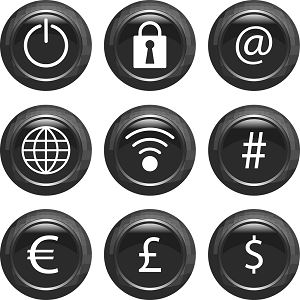In A Hurry? Click Here To Download This Post As A PDF To Read Later
The internet is swarming with fraudsters posing as legitimate businesses. Many have been defrauded of their hard-earned cash by these scammers, and many will continue to fall for their deceptive antics. It is essential to be aware of the various ways used by internet scammers to defraud unsuspecting members of the public to avoid falling into their trap. Trust me, these guys have mastered the art of deception, and you might never be safe from their trap if you don’t know what to look out for while surfing the internet. In this article, we will highlight some of the top online scams you should stay away from to protect yourself from scammers.
Phishing Emails And Web Pages

Phishing emails constitute one of the most serious threats on the internet at the moment. It is a favorite among internet scammers, and you should be on the lookout. Phishing emails are internet’s con game. In phishing emails, cybercriminals convince you to provide your password details using highly persuasive emails and web pages. Phishing emails and web pages have a huge resemblance to the sites of legitimate credit organizations such as PayPal and Citibank. They use scare tactics and enticements to lure you to a phony web page. They will send you an email about some unauthorized activities on your account, hence the need to urgently confirm your identity to prevent the loss of your funds. You will be led to a web page where you will be told to enter your password and ID.
The email sent to you will have a link that’s supposed to take you to the real website for confirmation of your account details. However, you will be secretly redirected to a fake website when you click on the link. Without knowing, you are on a fake site, you unwittingly enter your ID and password, which the scammers gladly harvest. And there goes your money.
The phishing scam works on the principle of people believing the emails and web pages. If you are in doubt, then don’t do it. A phishing website or email will usually be HTTP instead of the normal https. Never respond to any email that you find suspicious, and it may be your saving grace.
Lottery Scams

Lottery scams are one of the biggest scams on the internet. Many people have had the chance of winning insanely huge amounts of money from playing lotteries, and many others hope to be as lucky. Criminals capitalize on people’s hope of financial independence through winning a jackpot to defraud them of their money. You will receive an unsolicited email informing you of winning a huge amount of money. But you can’t remember ever entering an online lottery. How come you are a winner in a lottery you never played? They will congratulate you on your wins but then give conditions. To withdraw your winnings, you need to pay some money to allow them process and send the wins to your account. They will ask for personal information such as bank details, your driver’s license number, and others. If you receive this type of email, delete immediately.
Unfortunately, many people fall for this scam because of their dream of a larger than life existence. Don’t be fooled. If you follow their lead, you may end up losing your savings and identity. Be warned.
Employment Search Overpayment Scam
This scam is based on identity theft of people who submit their resumes on legitimate employment websites. Out  of the blue, you receive an email offering a job as a financial representative of an overseas company you don’t know about. They want to hire you because their company has difficulties accepting money from their customers and you will help them handle their payments. They will promise you 5-15 percent commission on every payment you receive on their behalf. When you apply for the position, you will provide personal data including bank account details to facilitate payment. This information may be used by the scammers for identity theft, and your money may be stolen from your account. They may send you fake checks or money orders and then instruct you to send about 90 percent of the money to your employer. In a short while, you will become a debtor to your bank.
of the blue, you receive an email offering a job as a financial representative of an overseas company you don’t know about. They want to hire you because their company has difficulties accepting money from their customers and you will help them handle their payments. They will promise you 5-15 percent commission on every payment you receive on their behalf. When you apply for the position, you will provide personal data including bank account details to facilitate payment. This information may be used by the scammers for identity theft, and your money may be stolen from your account. They may send you fake checks or money orders and then instruct you to send about 90 percent of the money to your employer. In a short while, you will become a debtor to your bank.
Advanced Fee Fraud For A Credit Card Or Guaranteed Loan
Why would any bank or credit agency charge you upfront for a credit card? These scams send offers of pre-approved loans and credit cards with up-front fees to unsuspecting customers. If you are observant enough, you won’t fall for this scams. Think about it. Why would any bank offer you up to $500,000 loans without any checks on your financial status and credit rating? But the sad truth is that many people fall into this trap and pay con artists the up-front fee. Eventually, they discover it was a charade designed to make them give up their money.
419 Scam

This scam emanated from Nigeria, and it has continued to evolve over the years. You will receive an email from a member of a purportedly rich family in Nigeria. They will tell you they are in a tight situation and need your help to evacuate a big stash of cash out of the country. In another variation of the scam, a woman in Africa who lost her husband is looking for a reputable church to bequeath her husband’s fortune of millions of dollars. What is common to these scams is that they promise you an unbelievably huge amount of money in return for tasks that are easy to carry out.
But many people can’t reject the offer as it is too enticing and life-changing to ignore. You will be tasked with helping with legal tasks and help with payment to some people so that the money can be released. You will continue to pay money to this people without seeing the dividends of your labor.
Travel Scams

These scams are common during the summer months when people travel to holiday destinations the most. They will send you an email offering you ridiculously low fares to exotic places, but they will also tell you the offer expires on that day. After calling, you will find that the travel is free, but the price of the hotels are insanely high. In some cases, the high fees are undisclosed until you sign up for the offer. In fact, some will take your money and disappear into the wind. In the event you want to cancel, you may never get a refund of your money. The best thing to do when booking your travels is to go through a reputable travel agency or legitimate online services.
Disaster Relief Scams

This scam is perpetrated by heartless criminals who capitalize on the misfortunes of natural disaster victims. In the aftermath of large-scale natural disasters such as Katrina, people organize disaster relief schemes to help the victims get their life together. Scammers use this opportunity to set up fictitious charity websites where unsuspecting members of the public donate to the relief cause. If you receive email soliciting funds for disaster victims, it may be from scammers.
Greeting Card Scams
You receive a greeting card from a “friend” but if you open it, your computer is infected with malicious software. The malware can be ransomware that forces your system to become part of a larger network of infected computers. With this malware running on your system, criminals can access the information on your system and your private and financial information may be in jeopardy.
Romance Scams

This scam is prevalent on social media networks such as Facebook and many dating sites. Most of these scams emanate from West Africa and are targeted at females from Europe and America.
The assailants pretend they love their victims to gain their trust, and when that happens, they start fleecing the target using some well-coordinated schemes. The scammer may claim he was involved in an accident and needs urgent financial assistance to foot medical bills. Victims may be kidnapped, and the families will be coerced into paying huge amounts of money in ransom.
Hitman Scam

This scam employs scare tactics to obtain money from their victims. Scammers may send an email to you threatening to inflict physical injury on your or your family member unless you pay a ransom within a specific timeframe.
The scammers paint a picture of having a deep knowledge about you by including many details about your life. But these details are usually gathered from the social media accounts of the victims. That is why people should desist from placing every detail of their lives on social media as many people have bad intentions on the internet.
Make Money Fast Scams
This is one of the most popular scams on the internet. Scammers offer bogus schemes that promise huge amounts of payments with little work. They post non-existent jobs such as work-at-home schemes, online typing schemes, and data entry jobs and so on. If you ever come across online job offers that promise thousands of dollars for simple tasks like data entry or typing jobs, it is most likely a scam. Don’t let the promise of free money mislead you; it may be a pit hole.
Fake Antivirus Software Scam

Have you ever seen a message such as “You have been infected! Download X antivirus now to secure your computer” on your screen while browsing the internet?
These pop-ups resemble real messages sent to your screen by your operating system or a legitimate security product. Many of these messages are only pop-ups, but some are malicious software like keylogger or Trojan. It may also be ransomware that can block access to your system until you pay a particular amount of money in exchange for a password to unlock your system. A specialized security product in addition to an antivirus program can help to safeguard your computer from these attacks.
Stock Market Scams
In this scam, you may receive an email or call promising you investments with unbelievably high returns. Many people fall for this scam, but you need to always be on your guard to avoid falling for this scam.
Tips To Avoid Falling Prey To Online Scams
Scrutinize Your Emails – Many times, you can differentiate scam emails from legitimate emails. If an email is missing contact details, has many grammar or spelling errors, or a mismatch of fonts, you might be dealing with a scam email. If the email is asking for your contact details or bank information, or payments, be wary of such an email.
Don’t Pay – If you receive an email offering a job or any other thing that requires you to pay for processing your application and so on. No legitimate employer will ask you for payments.
Research The Company’s Name – Find out more about the company offering you a job before making any payment. A simple Google search could be all that you need to blow the scam.
Don’t Be Greedy – If you want to get rich quickly, the chances of falling for internet scams is higher. If it’s too good to be true, it is most likely going to be a scam.
When browsing the internet, always be on your guard. Also, don’t be greedy as the dream of living a beautiful life without working may lead you into the trap of internet scammers. Remember if it’s too good to be true, it probably is.
I hope you enjoyed this post and if you have any questions about online scams or you just want to leave your own personal experience, leave a comment below. I would love to hear from you!







I still wonder why there are people who get scammed by lotteries, especially when they know they didn’t join one. All scams have one in common, the involvement of either physical cash or personal financial information. On my part, I live by this rule: I neither pay nor send financial details to anyone I don’t personally know or haven’t done research about. When it comes to finances, it’s okay to be skeptic most of the times.
Posts like this remind people how to be cautious when it comes to money-making opportunities. Great information, good job!
Hello… thank you for dropping by and taking the time to comment.
You are absolutely right all scams involve either money or personal financial information.. which again comes down to stealing your money!
I am so happy to hear the rule you live by and I wish more people would follow your example.
My goal on this site is to make people aware so they don’t fall victim to the scammers and to present only legitimate opportunities to people so they can better their life!
Appreciate your kind words.. continue to stay safe!
Thanks Moni for sharing this article, I had no idea of some of these – wow! Really appreciate the tips on how to avoid online scams making sure I am vigilant especially regarding unknown senders of emails. Thanks for sharing!
Hi Fleur.. thank you for dropping by and taking the time to comment.
The key to avoid getting scammed is to be vigilant.. stay safe!